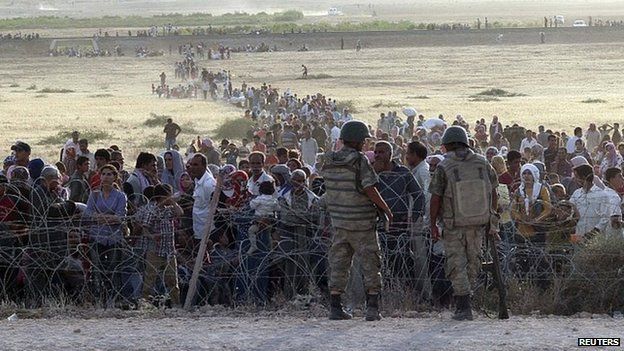Turkey opens border to Syrian Kurds fleeing IS
- Published

Turkey has allowed thousands of Syrian Kurds fleeing Islamic State (IS) militants to cross its southern border, Prime Minister Ahmet Davutoglu said.
TV footage showed exhausted people, mostly women and children, crossing into the south-eastern border village of Dikmetas under tight security.
The move followed clashes with Turkish Kurd protesters who were calling for the refugees to be allowed in.
Syrian Kurds have been massing along the Turkish border since Thursday.
They have been fleeing escalating clashes between IS and Kurdish fighters in the area.
Turkey - which shares a border with Iraq and Syria - has taken in more than 847,000 Syrian refugees since the uprising against President Bashar al-Assad began in 2011.
It is under pressure from Western countries to stem the flow of foreign fighters joining Islamic State.
Tear gas
Mr Davutoglu told reporters: "We will take in our brothers fleeing... from Syria or any other place without any ethnic or sectarian discrimination.
"We have taken in 4,000 brothers. The number might increase. Their needs will be met. This is a humanitarian mission."
Earlier, Turkish police and troops fired tear gas and water canon at scores of Turkish Kurds protesting in Dikmetas against Turkey's earlier refusal to let the refugees in, local media reported.
Officials had reportedly instructed those massed at the border to go to the Syrian Kurdish town of Kobane.
However, correspondents say IS has been closing in on the town, expelling Kurdish fighters from surrounding villages.
The capture of Kobane would give IS control of a large strip of Syria's northern border with Turkey, they say.
IS has seized large areas of Syria and Iraq but is being confronted in the north by Kurdish fighters.
Earlier this week, President Recep Tayyip Erdogan said Turkey was developing plans for a buffer zone on its border with Iraq and Syria.
Thirty countries have pledged to join a US-led coalition against the militants but Turkey has said it will only allow humanitarian and logistical operations from a Nato air base on its soil.
Analysts say it is reluctant to take a prominent role for fear of endangering 49 of its citizens being held hostage by IS.